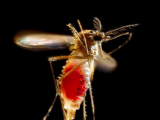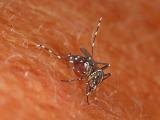Apr 5, 2013
CBC: Former Canadian food safety official tried to take Brucella vials to Asia
A former Canadian Food Safety Inspection Agency (CFIA) official has been charged with breach of trust for being caught last fall on the way to the Ottawa airport with 17 vials of Brucella bacteria in his possession, CBC News reported yesterday. Brucella species cause brucellosis, a disease that's mainly associated with cattle but can also afflict humans, and the pathogens are listed by the US government as select agents because they could be aerosolized and used for bioterrorism. Klaus Nielsen, 67, Richmond, Ont., was charged after a 19-month Royal Canadian Mounted Police (RCMP) investigation, as was another former CFIA researcher, Wei Ling Yu, 48, Ottawa, according to the CBC. Besides breach of trust, Nielsen is charged with several violations under the Human Pathogens and Toxins Act and two other laws. The investigation began with a CFIA call to the RCMP in March 2011, the story said. In 2003, Nielsen was one of six CFIA researchers who were awarded the Technology Transfer Award for developing a 15-second test for detecting brucellosis in cattle, the story said. An acquaintance said Nielsen had been traveling back and forth between Canada and China on business.
Apr 4 CBC story
VaxInnate awarded $2.2 million to develop dengue vaccine
The National Institute of Allergy and Infectious Diseases has awarded VaxInnate Corp. of Cranbury, N.J., a $2.2 million, 3-year grant to develop a recombinant dengue vaccine, the company announced yesterday. VaxInnate plans to use its proprietary technology to genetically fuse vaccine antigen to bacterial flagellin to stimulate an immune response. The approach dramatically improves vaccine potency, the company said in a press release. "VaxInnate's selection for this grant is another endorsement of the potential of our proprietary technology to meet critical and emerging public health threats," President and CEO Wayne Pisano said in the release. Dengue kills an estimated 25,000 people each year, according to the press release.
Apr 4 VaxInnate press release
On Twitter, anti-vaccine opinions more contagious than pro-vaccine views
Researchers who analyzed Twitter messages during the 2009 H1N1 flu pandemic found that negative sentiments about the H1N1 vaccine were more contagious than pro-vaccine views, and that pro-vaccine messages even sometimes backfired, according to a report in EPJ Data Science. A team from Penn State University tracked pro- and anti-vaccine messages on Twitter and then looked at how readers of the tweets expressed their own vaccine views, according to a Penn State press release. The researchers developed a computer algorithm for classifying tweets as positive, negative, neutral, or irrelevant, and they identified 318,379 messages that fell into one of the first three categories. They also devised a statistical model that included how many microbloggers each Twitter user was following, whether the followed microbloggers tended to tweet positively or negatively about the vaccine, the number of positive or negative tweets each microblogger sent out, and other variables. Unexpectedly, the researchers found that exposure to negative views was contagious, while exposure to positive ones was not. Even more surprising, the team found that a high volume of negative messages seemed to encourage people to tweet more negatively, but a high volume of positive message also seemed to engender more negative messages. "In other words, pro-vaccine messages seemed to backfire when enough of them were received," lead author Marcel Salathe, PhD, a Penn State assistant professor of biology, said in the press release.
Apr 4 EPJ Data Science abstract
Apr 4 Penn State press release



















